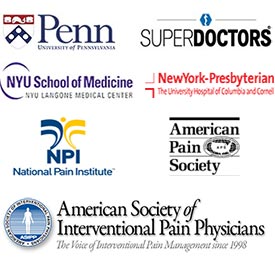Plantar Fasciitis (Heel Spur Pain) Specialist Doctors
At Manhattan Pain and Sports Associates you’ll get the plantar fasciitis (heel spur pain) pain management and doctor’s care you need to reduce or eliminate your heel spurt pain. Because when you’re in pain — whether it’s from an accident, sports, age, or ailment — you want relief quickly. Appropriate and targeted plantar fasciitis pain management and treatment starts with a proper diagnosis from our NYC heel spur pain management specialist.
Plantar Fasciitis (Heel Pain)
There is a thick band of tissue that runs under each foot and connects your heel to your toes. It’s called the plantar fascia and undergoes a great deal of stress every day. When that soft tissue band becomes inflamed, you feel the pain.
The disorder called plantar fasciitis leads to stabbing pain that’s especially pronounced when you wake up in the morning. After a little bit of stretching, the pain subsides, but it’ll likely return as you go through your day. The pain can strike after you’ve been standing for long periods of time or when you first stand up after sitting.
Who’s at Risk?
Runners are particularly vulnerable to developing plantar fasciitis because of the consistent pounding their feet have to endure. But any pain management doctor can tell you that other factors play into the condition as well, such as:
- Other forms of exercise that place extensive pressure on your feet, such as ballet and aerobic dancing
- Obesity, because your feet bear the major brunt of your weight
- Jobs that require you to stand on a hard surface all day, such as in a kitchen, factory floor or school room
- Age, since the condition seems to strike most consistently in people from 40 through 60
- Abnormal foot mechanics, such as flat feet, high arches or awkward walking strides that place undue pressure on your plantar fascia
What You Can Do
Visit Manhattan Pain and Sports Associates for treatment as soon as you feel pain in your heel. If you favor your other leg when walking, it could lead to pronounced abnormalities in your back, hips or knees.
Rarely are more tests needed when you visit a pain management specialist who sees cases of plantar fasciitis on a regular basis. Your explanation of the symptoms usually leads to the right diagnosis. X-rays and an MRI, however, can rule out other conditions causing your pain, such as a stress fracture, bone spurs or pinched nerve.
Treatments That Work
For most people in NYC, a few months of treatment can reverse the pain easily enough. Some treatment options include:
- Custom-fitted orthotics that go in your shoes and help align your feet properly
- Physical therapy to strengthen your calf and leg muscles and remove some of the pressure you place on your feet
- Splints that you wear while you’re sleeping and keep the tendon stretched
- Shock wave therapy, which works well on chronic plantar fasciitis that doesn’t respond to home care
- Steroid trigger point injections that provide temporary relief
- Surgery to replace a torn fascia, a treatment that very few people need to undergo
You can make lifestyle changes to ease your discomfort. These changes help keep your fascia intact, preventing further bouts of the painful condition. Try to:
- Maintain a healthy weight
- Change your favorite sport to one that’s less demanding on your feet, such as swimming or cycling
- Stretch your arches daily
- Wear supportive shoes, as recommended by your pain management doctor
- Buy new athletic shoes after every 500 miles of use
- Apply ice to the bottom of your feet when you begin to feel any discomfort
Get the Relief You Need For Your Plantar Fasciitis (Heel Pain)
Your NYC pain management doctor’s goal is to get you back to your normal routine with minimal downtime. After your plantar fasciitis (heel pain) diagnosis is confirmed, your doctor begins your plantar fasciitis (heel pain) pain management and treatment plan with the most conservative pain relief treatment. You’ll always receive non-invasive pain relief before your doctor turns to more invasive procedures like surgery.
Manhattan Pain and Sports Associates
51 East 25th St, 4th Floor, Ste B
New York, NY 10010
(212) 533-3954



